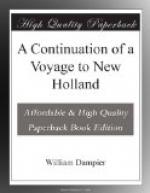at 10, the wind coming out, I tacked and had a fine
brisk gale. The ship we saw at anchor weighed
also and stood after us. While we passed by Pulo
Baby I kept sounding and had no less than 14 fathom.
The other ship, coming after us with all the sail
she could make, I shortened sail on purpose that she
might overtake us but she did not. A little after
5 I anchored in 13 fathom good oazy ground. About
7 in the evening the ship that followed us passed
by close under our stern; she was a Dutch fly-boat;
they told us they came directly from Holland, and had
been in their passage six months. It was now dark,
and the Dutch ship anchored within a mile of us.
I ordered to look out sharp in the morning; that so
soon as the Dutchman began to move we might be ready
to follow him; for I intended to make him my pilot.
In the morning at half an hour after 5 we weighed,
the Dutchman being under sail before; and we stood
directly after him. At 8, having but little wind,
I sent my boat aboard of him to see what news he had
brought from Europe. Soon after we spied a ship
coming from the east, plying on a wind to speak with
us, and showing English colours. I made a signal
for my boat, and presently bore away towards her;
and, being pretty nigh, the commander and supercargo
came aboard, supposing we had been the Tuscany galley
which was expected then at Batavia. This was
a country ship belonging to Fort St. George, having
come out from Batavia the day before, and bound to
Bencola. The commander told me that the Fleet
frigate was at anchor in Batavia Road, but would not
stay there long: he told me also that His Majesty’s
ships commanded by Captain Warren were still in India,
but he had been a great while from the coast and had
not seen them. He gave me a chart of these straits
from the Button and Cap to Batavia, and showed me
the best way in thither. At 11 o’clock,
it being calm, I anchored in 14 fathom good oazy ground.
Arrival at Batavia.
At 2 o’clock we weighed again; the Dutch ship
being under sail before, standing close to Mansheters
Island; but, finding he could not weather it, he tacked
and stood off a little while, and then tacked again.
In the meantime I stood pretty nigh the said island,
sounding, but could not weather it. Then I tacked
and stood off, and the Dutch stood in towards the
island; and weathered it. I, being desirous to
have room enough, stood off longer and then went about,
having the Dutch ship 4 points under my lee.
I kept after him; but as I came nearer the island I
found a tide setting to the west, so that I could
not weather it. Wherefore at 6 in the evening
I anchored in 7 fathom oazy ground, about a mile from
the island: the Dutch ship went about 2 miles
further, and anchored also; and we both lay still
all night. At 5 the next morning we weighed again,
and the Dutch ship stood away between the island Cambusses
and the main; but I could not follow because we had
a land-wind. Wherefore I went without the Cambusses,
and by noon we saw the ships that lay at the careening
island near Batavia. After the land-wind was spent,
which we had at south-east and south-south-east, the
seabreeze came up at east. Then we went about;
and, the wind coming afterward at east-north-east,
we had a large wind to run us into Batavia Road:
and at 4 in the afternoon we anchored in 6 fathom
soft oaze.




